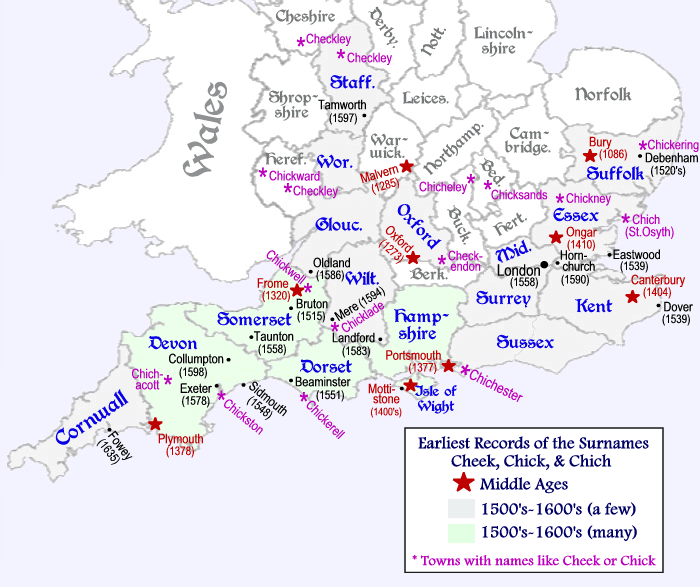About us
The Cheek/Chick DNA Project began in 2003 with 5 participants from Cheek families in North Carolina and Georgia. Since then, we have tested 70+ individuals representing several different Cheek and Chick lineages in the United States, England and Australia. We welcome anyone with named Cheek, Chick, or a related surname, or anyone who believes they may be descended from the Cheeks or Chicks in the direct male line.
Surname Origin
CHEEK and CHICK are related surnames that come from southern England. "Chick" is more common than "Cheek" in early English records, but it was probably pronounced "Cheek" because the letter "i" had a long "ee" sound in Middle English (like it does in Latin). Other spelling variations include Cheak, Cheeke, Cheke, and Chich. Before 1700, these surnames were most common in the historic region of Wessex, particularly Devon, Dorset, Somerset, Hampshire, and the Isle of Wight. There are also scattered examples in records from southeast England, the West Midlands and East Anglia.
Commoners in England did not have family names before Middle Ages, but individuals often had nicknames that referred to their village, occupation, physical features, or paternity. These nicknames gradually evolved into surnames. There are several theories about the meaning of the Cheek/Chick surname. Maybe it began as a nickname for someone with big cheeks, red hair (like a rooster's comb) or a rooster-like personality. It could also have a geographic origin. There are a number of towns and villages in southern England with "Chick" names such as Chich, Chickney, and Chickston. A nickname like "John of Chickston" could have eventually been shortened to "John Chick".
Placenames in southwest England often have Celtic origins. Celtic languages were spoken in Somerset, Dorset, and Devon for hundreds of years after the Anglo-Saxon invasions and still survive today in Cornwall. The Cornish word for house, "chy" (pronounced "chee") is the root of many village names in Cornwall. Combined with the Cornish word for hedge ("keas"), "chy-keas" (pronounced "cheeks") might have referred to a fortified house or town.

Surname Origin
CHEEK and CHICK are related surnames that come from southern England. "Chick" is more common than "Cheek" in early English records, but it was probably pronounced "Cheek" because the letter "i" had a long "ee" sound in Middle English (like it does in Latin). Other spelling variations include Cheak, Cheeke, Cheke, and Chich. Before 1700, these surnames were most common in the historic region of Wessex, particularly Devon, Dorset, Somerset, Hampshire, and the Isle of Wight. There are also scattered examples in records from southeast England, the West Midlands and East Anglia.
Commoners in England did not have family names before Middle Ages, but individuals often had nicknames that referred to their village, occupation, physical features, or paternity. These nicknames gradually evolved into surnames. There are several theories about the meaning of the Cheek/Chick surname. Maybe it began as a nickname for someone with big cheeks, red hair (like a rooster's comb) or a rooster-like personality. It could also have a geographic origin. There are a number of towns and villages in southern England with "Chick" names such as Chich, Chickney, and Chickston. A nickname like "John of Chickston" could have eventually been shortened to "John Chick".
Placenames in southwest England often have Celtic origins. Celtic languages were spoken in Somerset, Dorset, and Devon for hundreds of years after the Anglo-Saxon invasions and still survive today in Cornwall. The Cornish word for house, "chy" (pronounced "chee") is the root of many village names in Cornwall. Combined with the Cornish word for hedge ("keas"), "chy-keas" (pronounced "cheeks") might have referred to a fortified house or town.
